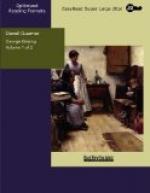“Certainly many of them are,” conceded Glazzard.
“Lamentable,” sighed the Mayor, raising his glass, “to think that quite a large number of his books have been put into the Institute library! We must use our influence on all hands, Mr. Vialls. We live in sad times. Even the theatre—I am told that some of the plays produced in London are disgraceful, simply disgraceful!”
The theatre was discussed, Mr. Vialls assailing it as a mere agent of popular corruption. On the mention of the name of Shakespeare, Mr. Mumbray exclaimed:
“Shakespeare needs a great deal of expurgating. But some of his plays teach a good lesson, I think. There is ’I read Romeo and Juliet,’ for instance.” Glazzard looked up in surprise. “I read ‘Romeo and Juliet’ not long ago, and it struck me that its intention was decidedly moral. It points a lesson to disobedient young people. If Juliet had been properly submissive to her parents, such calamities would never have befallen her. Then, again, I was greatly struck with the fate that overtook Mercutio—a most suitable punishment for his persistent use of foul language. Did you ever see it in that light, Mr. Glazzard?”
“I confess it is new to me. I shall think it over.”
The Mayor beamed with gratification.
“No one denies,” struck in Mr. Vialls, “that to a pure mind all things are pure. Shakespeare is undoubtedly a great poet, and a soul bent on edification can extract much good from him. But for people in general, especially young people, assuredly he cannot be recommended, even in the study. I confess I have neither time nor much inclination for poetry—except that of the sacred volume, which is poetry indeed. I have occasionally found pleasure in Longfellow”——
“Pardon me,” interrupted the Mayor—“Longfellow?—the author of that poem called ’Excelsior’?”
“Yes.”
“Now, really—I am surprised—I should have thought—the fact is, when Raglan was at school, he had to learn ‘Excelsior,’ and I happened to glance over it. I was slightly acquainted with the piece, but I had quite forgotten that It contained what seems to me very gross indelicacy—very gross indeed. Do you remember a verse beginning (I must ask your pardon for quoting it, Mr. Vialls)—
’Oh stay, the maiden cried, and rest
Thy weary head upon this breast.’
Surely, that is all but indecency.
In fact, I wrote at once to the master and drew his attention to the passage, requesting that my boy might never be asked to repeat such a poem. The force of my objection was not at once admitted, strange to say; but in the end I gained my point.”
Mr. Vialls screwed up his lips and frowned at the table-cloth, but said nothing.
“Our task nowadays,” pursued the Mayor, with confidence, “is to preserve the purity of home. Our homes are being invaded by dangerous influences we must resist. The family should be a bulwark of virtue—of all the virtues—holiness, charity, peace.”




